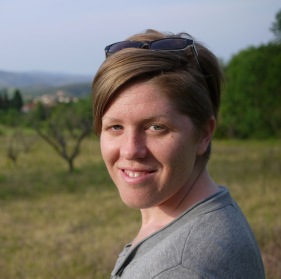21 May 2013
Katie Day, artistic director

Katie Day is the artistic director of a theatre company, initiating and directing new productions and leading strategic development. She lives in Birmingham with her husband and baby.
Can you explain a bit about your work?
I make new theatre experiences with my company The Other Way Works. Performances mostly take place not in theatres, but in alternative venues and can stretch the boundaries of what people think theatre is. Our audiences are often invited to interact with the performers.
You’re a theatre director but you don’t produce shows in theatres, how does that work?
I like to work in real locations – they win hands down compared with a set and it saves an awful lot of building, buying and waste. We partner with theatres, festivals and arts programmers, so audiences still come across our performances via a programme or venue website, rather than stumbling across them on a walk in the park (but they might in the case of our Bandstand project).
Everyone loves a good Shakespeare though, don’t they?
I directed The Tempest the year after I graduated, and it was probably the most challenging thing I've ever done. The depth and density of the text was incredible, and managing such a large cast was hard work. Of course I couldn't resist swapping the genders of most of the characters so that the women were the powerful ones.
What made you reject traditional theatre?
“Reject” is too strong, I think of it as acknowledging the existing canon and moving forward. Our shows rely on established theatre conventions, even if we sometimes purposefully ignore them. Theatre has spent the last 50 years trying to be more like films. I think we need to celebrate theatre for what it’s good at – being live. When an audience member interacts directly with a performer, that’s when it becomes most tangible and exciting. I try to make theatre that I'd like to experience myself.
What’s the craziest show you’ve created?
Black Tonic and Avon Calling are both unusual.
Black Tonic is an adventure for four people in the bedrooms and corridors of a hotel. The Independent called it a “mystery about anonymity and intimacy, the effects of light and sleep deprivation, and a blind date between the nightly life of a hotel and the endless possibilities of dramatic fiction”. We're planning to revive the show in 2014.
Avon Calling is a theatrical Avon party performed in your own living room. A keen audience member hosts and invites nine friends, and our 'Avon Lady' rings the doorbell and leads themed games. What starts off as light entertainment grows ever more poignant as we discover more about the woman behind the make-up mask.
Ever fancied making a show centred around a Bible story?
I always liked the story of Jael and that tent peg. She was a pretty feisty lady. We did start investigating making a work about the experience of recent immigrants using the story of Ruth as a basis, but we haven't pushed it through to production as yet.
What part of your job brings the most satisfaction?
The response of an audience after experiencing a show. We've had people tell us that shows have made them see things differently. One man even decided to leave a cult after having a strong reaction to one of our early shows! I enjoy how people are buzzing, deeply touched, or really surprised by how involved they became.
Best theatre show ever?
Impossible to say. I enjoyed Before I Sleep by Dreamthinkspeak – a large installation version of The Cherry Orchard with a crazy bit where you suddenly come out in a Russian department store and you can buy real furniture. And years ago, The Watery Part of the World by Sound & Fury, which was an intense sound-based work experienced entirely in total darkness.
How do you respond to people who think that because you are a Christian you should be making ‘Christian’ theatre?
I guess, in a way, I feel like I am, though not in a Christian context, through Bible stories, didactic issues, or an altar call. But I hope that through the themes we explore and the open and collaborative way in which we make the work, that it is a witness to Jesus and his teaching. We often look at the world from the perspective of the outsider, or the person with the least power, and treat each audience member as a valued individual.

